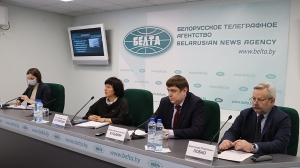Expert explains Belarus' nuclear safety infrastructure

MINSK, 14 February (BelTA) – Head of the Nuclear and Radiation Safety Department of the Belarusian Emergencies Ministry (Gosatomnadzor) Olga Lugovskaya told BelTA about the development of nuclear and radiation safety infrastructure in Belarus.
“You know that on 2 June the Belarusian nuclear power plant was granted a license to operate its first power unit. Our country has transformed in a sense and received a new status. Earlier we were a newcomer in this industry, while now we are a country operating a nuclear power plant,” Olga Lugovskaya said.
According to her, this was preceded by a very long way of building the nuclear and radiation safety infrastructure in the country. “It is not only about the construction of a nuclear power plant, but also about the creation of tools, mechanisms, regulatory structures, matrices to make sure that all participants in this process operate properly and safely. This is laid down in the recommendations and requirements of the International Atomic Energy Agency. What are the main elements of the nuclear and radiation safety infrastructure? First of all, this is a regulatory framework, the organization of a licensing process, a supervisory system, inspection activities in this field, the system of emergency response, emergency preparedness, safety assessment and examination, the country's international obligations related to its nuclear program and notification of all stakeholders about the state of nuclear and radiation safety," the head of Gosatomnadzor said.
Olga Lugovskaya stressed that all decisions in this field should be scientifically based. "They must be worked out by the expert community so that these are truly optimal and correct decisions," she continued. “At all stages of the implementation of the first nuclear program, we relied on the knowledge and expertise of the specialists of the technological support system. This system has evolved substantially, too. At the start our central organization, which provided scientific and technological support for the construction of the Belarusian NPP, was the Joint Institute for Energy and Nuclear Research Sosny at the National Academy of Sciences of Belarus. “This sector requires a high level of competence in various areas, so the main efforts were focused on gradual consolidation of all scientific and expert resources to make certain decisions related to various aspects of the nuclear program. Today we have an integral system that includes 17 organizations. These are research institutions, educational institutions that provide training for the personnel responsible for scientific and technical expert approaches to solve various tasks that arise in the process of regulating the nuclear and radiation safety sector,” she said.
Olga Lugovskaya added that an organization has been set up to act as a coordinator. This is the Center for Nuclear and Radiation Safety under the Emergencies Ministry. “The organization is new. It has just been set up, and is already fully involved in the process of preparing various technical and expert decisions,” she said.













